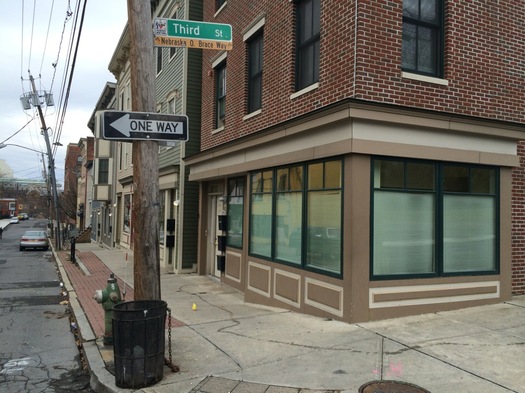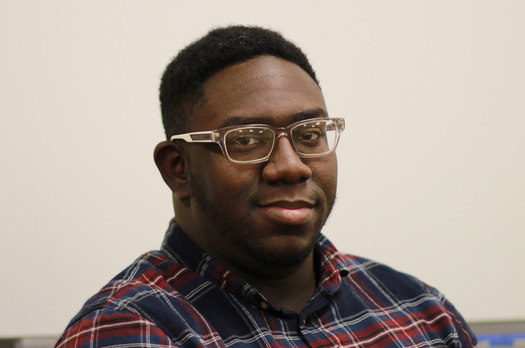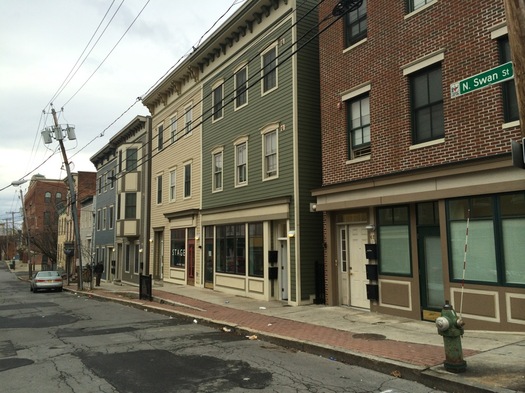A bid to SPARK + THRIVE in Arbor Hill

At the corner of North Swain and Third Street.
A new co-working space is set to open just down the street from the Albany Barn in February. SPARK + THRIVE is billed as a "collaborative workspace for freelancers, creatives, startups, professional small business owners and college students." The founder of the space is Kaciem Swain -- he'll be running it via his startup agency Flagship Ultra, in partnership with the Albany Housing Authority.
We got a chance to talk with Swain recently. He's an interesting guy, with a wide range of business experiences -- from event production, to entertainment management, to marketing.
So we were interested to hear his thoughts about opening a co-working space, and the direction of Albany's Arbor Hill neighborhood.
Why a co-working space?
I own a small business myself, and I've always liked the idea of co-working. I want to work with people that I can collaborate with.
I grew up in Arbor Hill. My father was active in the community, I was active in the community. And when the [Albany] Barn came, I was like this is cool... it should have been a co-working space, that's what I was thinking. And they're like, it is but it isn't. Everyone has their own offices. The energy is different.
So, I wanted to do something that Arbor Hill doesn't have. Troy has the Center of Gravity. Albany has the Beahive, which is small and intimate, but they're not doing programming, bringing people in from the community to teach them how to start small businesses. So for me it's really about the opportunity to teach people how to start and grow a small business in the area.
Albany hasn't always been the most supportive of starting a small business or running and growing them. The process of trying to do something versus going to Schenectady or going to Troy -- it's way less red tape in those cities than in Albany.

Kaciem Swain. / photo courtesy of Kaciem Swain
When I first opened a [shared office] a couple years ago, I had first month, last month, security, that was $3,800. Then I had to get insurance. Time Warner Cable for a commercial space is not what it is for a home, it's $300 a month. So the barriers to get a space, that's usually either too big or too small, for a small business is ridiculously high. So I want to lower that barrier to entry for people who want to create and want to be able to provide a service or want to be able to network with likeminded people who are creative or people who just want to get out of the house. ...
I think the most complained about thing [about co-working spaces] is usually the cost. Can I afford the $300 a month? Can I afford the $200 for two weeks? I can afford the $20 drop-in, but is this going to be a good investment for me, am I going grow if I'm there?
So it's about trying to providing services so that once you're here you can grow. Or I can find someone to bring in programming that's going to help people grow, and networking opportunities to help people find new clients, expand their business, hire new employees -- hire the right employees.
What's your sense of Arbor Hill right now, the state of the neighborhood and where it's going?
Arbor Hill's going through a change. I grew up there, I've been in Arbor Hill for 25 years.
I used to be on Orange and Dove Street, growing up I'm thinking my family owns most of these properties. And it's like, as Habitat for Humanity and the land bank start buying up all these properties on Orange Street, on Sheridan, I'm talking to my family, like, you're about to make some money, you can move to a better house. They're like, we don't own these properties. It's like, why not? You've been here 25+ years. There are three families in each house that are related. You're paying $600 a month for rent -- that's $1,800 a month. You could have a $600-a-month mortgage. You could leave something to your kids.
I've seen a lot of change coming to the neighborhood. They've got condominiums at the bottom of Orange Street [at Chapel]. (Laughing.) If you had tried to do that 20 years ago, people would be like, nah... you're not putting condos down here.
You said you could kind of see this happening. What were the ingredients there that you thought, yeah, Arbor Hill is going to start moving in that direction?
For me, I saw the change coming when the Metropolitan church ended up buying a plot of land next to them to expand. I'm like, if a church is willing to invest millions of dollars in this neighborhood to expand, then that says a lot about the state of the neighborhood. If it's unsafe, or if nobody wants to live there or travel there, nobody's going to be willing to spend millions of dollars.
Then the Albany Barn, you heard about that coming. And it's like, that's going be great. If the city and Albany Housing is willing to spend millions of dollars in this neighborhood, that says a lot. Then they start tearing down Ida Yarbrough and redeveloping it -- that's going to take a couple of years.
But it's like, OK, you're starting to see investment getting made right in that area. They built the gas station on the bottom of Broadway, which is not that far from there. The two brothers want to turn that vacant property [on Broadway across from the post office] into apartments. That's not too far from what people consider "the 'hood," but it's still in the neighborhood.
So I see all these investments being made and it's a lot of opportunity for people to move into this neighborhood and help be a part of the change, redevelop the neighborhood.

You mention people moving into the neighborhood and new investment. What do you think are ways for people already there to benefit from this, to grow something there?
I'd like to see people who already are in the neighborhood to start owning their homes. There's a lot of rentals over there. Albany Housing owns a lot of property over there, the land bank owns a lot of property in Arbor Hill, in Sheridan Hollow.
I was just at an event at The Barn, they're trying to figure out for zoning what businesses, what restaurants, what housing situations people would like to see in the neighborhood so they can start to develop it or redevelop it, so people can come to the community and want to live there and stay there.
Because all the state workers park in Arbor Hill, but none of them stay there after five o'clock. You've got thousands of people here in the morning for 30 minutes, then nobody's there all day, lunch 30 minutes, and then after everybody leaves. So none of that money is staying in the community. So how do we build infrastructure to make people want to live there?
And the people who are already there want to stay there, not move. And I feel like they're being forced to go to other neighborhoods. And I think all of that [situation is part of] home ownership.
What do you think the barriers are to people becoming home owners?
A lot of it is education. Nobody's out here in the community educating people about what credit is and how to own a home. We live in an age where there's a lot on the internet, but people don't have access to that, either. There's still a barrier to having internet at home. ... I would love to see the city invest in infrastructure for internet access.
And a lot of if it is risk. If you're not educated correctly, you're scared. You're thinking, I don't know how to take care of a home. What if I lose my home? Home foreclosure is scary. And it's like, what if I can't afford it? What if I lose my job?
And a lot of it is job and pay. A lot of jobs don't pay much. If you don't have the education, how do you learn skills to get a job that's going to pay $15 an hour or more, so you can take care of yourself, or maybe yourself and two kids.
How does that change?
Key investments. The right partnerships. Developing the right relationships. And people who are willing to actually do the work.
That's why I want to be in that neighborhood. Because I have no problem calling up banks and saying, hey, come in and do seminars for the neighborhood. Let's get people in here and teach them how to own houses, how to start businesses that are sustainable and stay in the community -- and how to hire from within the community.
This interview has been edited and condensed.
____
SPARK + THRIVE is scheduled to open in February at 42 North Swan Street in a 850-square-foot storefront space. Swain says rates will range from $25 for one day, to $150 for 15 days, to $225 for a month. Included with that fee will be access to office services such as printing and internet access and coffee, along with access to creative and design tools, and events.
Find It
Spark + Thrive
42 N Swan Street
Albany, NY 12210
Say Something!
We'd really like you to take part in the conversation here at All Over Albany. But we do have a few rules here. Don't worry, they're easy. The first: be kind. The second: treat everyone else with the same respect you'd like to see in return. Cool? Great, post away. Comments are moderated so it might take a little while for your comment to show up. Thanks for being patient.
Comments
What a great concept. Best of luck to you!
... said T on Dec 11, 2015 at 11:15 AM | link
Just want to make sure people know that there are nonprofit community groups actively doing homeownership education and some good resources out there. The Affordable Housing Partnership Homeownership Center at Orange and Dove Street in Albany is the place to start if you're thinking of buying a home. Over 100 people sign up for free Homebuyer 101 every month for unbiased advice, and information on area homebuyer programs. We follow up with more personalized information, money strategies class, and credit repair. 101 low/mod income families took advantage of our First Home Club downpayment program this year which offers $4 dollars for every $1 saved. That's an $800,000 boost to neighbors and our economy. We strive for successful and sustainable homeownership, so we also have a strong foreclosure prevention program, a community land trust to fix vacant homes for homeownership and energy efficiency efforts to make homes more affordable. Next Homebuyer 101 is Tuesday, January 5. Sign up at www.ahphome.org.
... said Louise on Dec 11, 2015 at 12:47 PM | link
Some 15 years ago when the Arbor Hill Plan was being mapped out there were a lot of people in the community trying new ways to make Arbor Hill come back from its doldrums. The effort has gone in many different directions. There have been efforts at creating an Arbor Hill Business Improvement Group and providing training in small business and encouraging people to become involved in the business incubator on Orange Street. Mr. Swain relates "I was active in the community" but I would hope I had seen him in some o f these efforts. There are so many resources in the community and I am glad to see them. With all of these efforts in process he observes "but they're not doing programming, bringing people in from the community to teach them how to start small businesses." The Community Loan Fund runs a business education course utilizing the resources of the College of Saint Rose and we have been running it since 2001. Nearly a thousand people have taken the course. I was really interested in what Mr. Swain was saying. Any thing about business is of interest to me in my role as training and technical assistance director for the Community Loan Fund with its office on Orange Street and Dove - where its been for the last near 20 years. It was over in West Hill before that. It is now 30 years old and it started on lower Clinton Avenue in Arbor Hill. In working with thousands of people over the years, many of them in and from Arbor Hill, I was surprised to see some of his comments. For instance, "Albany hasn't always been the most supportive of starting a small business or running and growing them." I have never found that to be the case. Mostly what I have found is that those looking to start businesses over estimate the kind of support they will get from the community, they over estimate the amount of interest there is in their effort and as a result their businesses fail or they lose interest in them and bring them to a close. It is not that it is easier to start a business elsewhere. It may be easier to sustain a business other places but that is one of the things any prospective business person should sort out in their business plan BEFORE they start. They need to answer the question of "where is the best place to start my business" and a lot of start-up businesses don't do that.
Another comment that surprise me is "A lot of it is education. Nobody's out here in the community educating people about what credit is and how to own a home." This is also surprising since right at the corner of Orange and Dove in an old warehouse and across the hall from the Community Loan Fund is the Home Ownership Center which conducts classes every month and offers counselors on home ownership. They've been there for a long time. Their partner organization, the Albany Land Trust, has also been educating people about home ownership and making homes affordable for years. Then there's "still a barrier to having internet at home. ... I would love to see the city invest in infrastructure for internet access." I also wondered about Albany Freenet and its free internet access which is accessible in Arbor Hill and the fact that so many people have cable and that internet access is just a few dollars more piggybacked on their cable hookup and the free internet through the library. I am looking forward to connecting with SPARK AND THRIVE since it is a good resource to the community but I am hoping the other resources in the community don't get overlooked or a business fail because inadequate market research has been done.
... said Paul Stewart on Dec 11, 2015 at 3:36 PM | link
Welcome to the coworking world, Swain! Point of clarification: Beahive does do programming... though we could certainly do more in Albany. Best of luck to you. Here's to growing the movement!
... said Scott Tillitt on Dec 11, 2015 at 5:58 PM | link
Can't wait to see the great things that will come from SPARK + THRIVE!
... said John on Dec 11, 2015 at 6:30 PM | link
I like this idea and I hope it has great success. But usually when an area redevelops the existing demographic is not able to afford to stay in that neighborhood and usually doesn't benefit from the investment and changes
... said Lameka on Dec 12, 2015 at 10:51 AM | link
Very interesting - on several levels
... said Jay Purner on Dec 13, 2015 at 8:04 PM | link
I don't think Arbor Hill is unique. The problems of Arbor Hill are the same as the problems of the urban working class and the urban poor everywhere. The area has not only deteriorated from redlining - which still occurs in more subtle forms - but also from the simple fact that economic opportunities and wages for the working poor and working class have diminished in the last 30 years. You cannot buy and maintain a property if you're only making $10 an hour. Back in 1980 a comparable family could make the equivalent of $15-20 an hour with the same or less education working in manufacturing. Add in the war on drugs, and you're taking hundreds of would be breadwinners out of the neighborhood. All of these efforts, while noble, will not get at the root problems that keep areas like Arbor Hill mired in poverty and abandonment. You need national policy changes.
... said Paul on Dec 18, 2015 at 8:17 AM | link